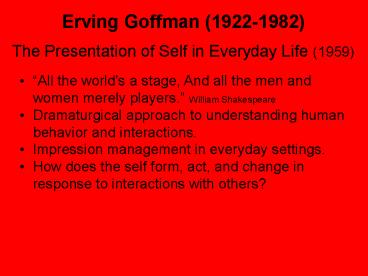Erving Goffman 19221982 - PowerPoint PPT Presentation
1 / 7
Title:
Erving Goffman 19221982
Description:
'All the world's a stage, And all the men and women merely players.' William Shakespeare ... How does the self form, act, and change in response to ... – PowerPoint PPT presentation
Number of Views:742
Avg rating:3.0/5.0
Title: Erving Goffman 19221982
1
Erving Goffman (1922-1982)
The Presentation of Self in Everyday Life (1959)
- All the world's a stage, And all the men and
women merely players. William Shakespeare - Dramaturgical approach to understanding human
behavior and interactions. - Impression management in everyday settings.
- How does the self form, act, and change in
response to interactions with others?
2
Erving Goffman (1922-1982)
The Presentation of Self in Everyday Life (1959)
- The self attempts to define the situation, to
exert itself within its conception of itself. - Others try to do the same.
- Familiarity breeds cohesion and solidarity
because the interacting selves blend well with
one another. - Agreement is stressed and opposition is
underplayed. - Discrepant roles have a difficult time fitting
into the play.
3
Erving Goffman (1922-1982)
The Presentation of Self in Everyday Life (1959)
- Discrepant roles have a difficult time fitting
into the play. - The other members try to save the play by
bringing the discrepant player into the play
(see peer pressure, normative expectations.) - The team members will select players who are
loyal to the selves in the play.
4
Erving Goffman (1922-1982)
The Presentation of Self in Everyday Life (1959)
- How do members of one play interact with members
of another play? - Technical goal achievement.
- Political power.
- Structural horizontal and vertical hierarchies
of statuses. - Culturally moral values of the larger group.
5
Erving Goffman (1922-1982)
The Presentation of Self in Everyday Life (1959)
- What kinds of interactions occur between teams
with very different understandings of self? - Embarrassed and confused halt.
- Less productive and efficient social structure.
- Individuals become disenchanted, angry, hurt,
confused, etc. - Thus, performance disruptions have negative
consequences for interaction, society, and
personality.
6
Erving Goffman (1922-1982)
The Presentation of Self in Everyday Life (1959)
- Expression Communication of the self.
- Impression Conclusions made from expressions.
- Fundamental dialectic of social interaction
- Thesis Desire for full information.
- Antithesis Impossible to obtain.
- Synthesis Guesses about the full information
based upon expressions.
7
Erving Goffman (1922-1982)
The Presentation of Self in Everyday Life (1959)
- Staging and the Self
- The performer Impression management.
- The character Noble inner self.
- The show involves impression management of ones
good character. - The staged performance, however, is neither given
nor fixed. The performance reflects the setting
the impression management of others and the
structure of society. - The staging of the self is for real and has real
consequences for the actor and others.






























